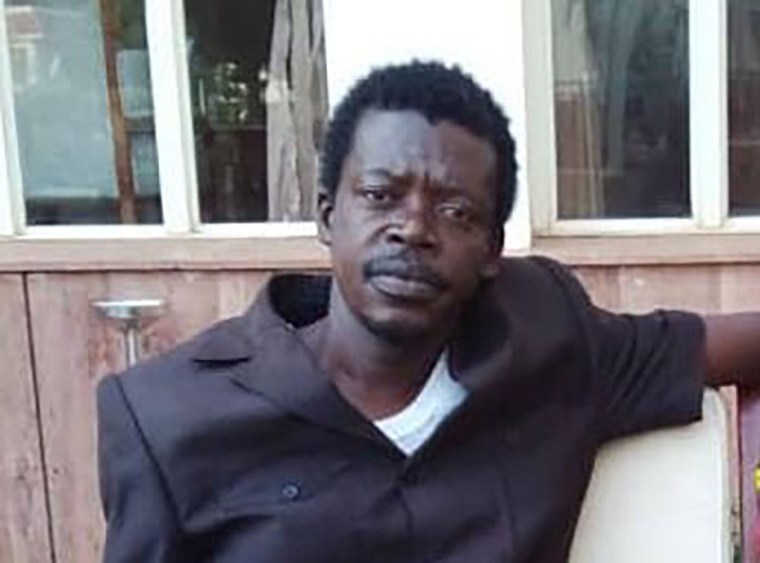New York, December 17, 2021 — Central African Republic authorities should release journalist Landry Ulrich Nguéma Ngokpélé and ensure he can work free of harassment and fear of arrest, the Committee to Protect Journalists said today.
At around noon on October 4, members of the Central African Republic police and military arrested Nguéma Ngokpélé, the publication director of the privately owned Le Quotidien de Bangui newspaper, in Bangui, the capital, according to the journalist’s wife, Philomene Nseya Muteba, who visited her husband in detention and relayed information from him to CPJ via messaging app. Nguéma Ngokpélé has written articles about the diplomatic relations between Libya and the Central African Republic and often shares his reporting on social media, according to a local journalist familiar with the case, who requested anonymity for safety reasons.
In messages shared with CPJ via his wife, the journalist said he faced prosecution by investigating judge Thierry Blaise Angalaka Nzapato for alleged complicity with the rebel group Coalition of Patriots for Change (CPC), criminal association, defamation, insult, and slanderous denunciation.
“Authorities in the Central African Republic must release journalist Landry Ulrich Nguéma Ngokpélé and ensure the press in their country can work without fear of harassment or arrest,” said Muthoki Mumo, CPJ’s sub-Saharan Africa Representative, from Nairobi. “No journalist should be denied their freedom simply for doing their job.”
On October 4, Nguéma Ngokpélé was in the courtyard of a local stadium when Harouna Douamba, the president of Aimons Notre Afrique, a local nongovernmental organization, spotted him and communicated to the military and police that the journalist was an accomplice of the CPC. Security forces arrested Nguéma Ngokpélé and he was later transferred to the local Ngaragba Central Prison, Muteba said.
Muteba added that the journalist had no affiliation with the CPC. CPJ was unable to confirm the basis of the complicity and criminal association allegations against Nguéma Ngokpélé.
CPJ reviewed court documents dated October 27, which stated that the defamation, injurious publications, and slanderous denunciation allegations stemmed from publications shared by the journalist on social media that allegedly defamed Maxime Balalou, the Central African Republic’s minister in charge of the general secretariat of the government, a senior administrative position in the national government, by referring to him as “a corrupt minister, manipulated by a gang of Libyan mafia,” the documents said.
The documents did not specify the exact publications allegedly shared by the journalist. One article written by Nguéma Ngokpélé, which CPJ reviewed, was published by Le Quotidien de Bangui and titled “Minister Balalou Maxime manipulated with banknotes by a gang of Libyan mafia?”
According to the court documents, Nguéma Ngokpélé emphasized the title was “only a question.” “I did not call the Minister corrupt, but it was a question,” he added.
The court documents also stated Nuéma Ngokpélé had been questioned without a lawyer present.
Defamation and insult of a government official, a violation of Article 135, is punishable with between three and 10 years in prison and a fine of 500,000 Central African francs (US$862), according to the Central African Republic’s penal code. However, if the offense is deemed to take place “in the presence” of officials other than the president, the prison sentence can be two to five years and the fine increased up to 1 million Central African francs (US$1,725).
Criminal association is punishable with “forced labor,” according to Article 412 of the penal code. Articles 11 and 12 of the penal code, which relate to complicity in “conspiracies or provocations prejudicial to the internal or external security of the State,” among other crimes, indicate that accomplices of a crime are to receive the same penalty as the perpetrators.
In July, Vicent Namroba, the general rapporteur of the High Council of Communications, the Central African Republic’s media and communications regulator, told CPJ that under the country’s laws, no journalist should go to prison for their work.
If Nguéma Ngokpélé were instead convicted of defamation under Article 145 of the country’s 2020 Law on Freedom of Communication, which CPJ reviewed, he could face a fine of 100,000 to 500,000 Central African francs (US$180 to $901).
Previously, in June, Nguéma Ngokpélé was arrested and held overnight in connection with a defamation complaint filed by Douamba, as CPJ documented at the time. The arrest took place during his required appearance at the Bangui prosecutor’s office as part of a separate defamation case from September 2020, stemming from Le Quotidien de Bangui’s coverage of alleged corruption by the country’s minister of water, forestry, hunting, and fishing.
Through his wife, the journalist told CPJ that he believed there was “an indisputable link” between his arrest over Douamba’s complaint and his present detention. Muteba added that Nguéma Ngokpélé had a high fever while in detention.
Douamba acknowledged messages sent by CPJ via messaging app but did not respond to any questions about his alleged involvement in Nguéma Ngokpélé’s arrests. Reached by phone and messaging app in late November, Angalaka Nzapato declined to comment on the case.
CPJ’s questions sent via messaging app to Balalou and Central African Republic public prosecutor Laurent Lengande were marked as read, but went unanswered.
Nguéma Ngokpélé’s detention was documented as part of CPJ’s 2021 prison census, which annually profiles every journalist behind bars on December 1 around the world.
[Editors’ note: This article has been changed in its eleventh paragraph to correctly reflect the penalties for defamation.]
